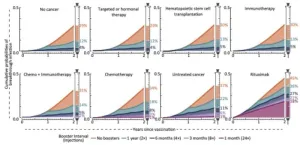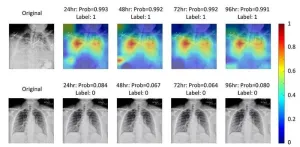(Press-News.org)
New Haven, Conn. — For many, the threat of the COVID-19 pandemic seems over. However, for patients whose immune systems are compromised by cancer or by cancer therapies, fear of COVID-19 infection and severe disease remains very real.
Currently, CDC guidance recommends that immunocompromised patients receive COVID-19 booster shots “as needed.” While this flexibility is useful for patients with complex medical conditions, more specific guidance is lacking as to when additional COVID-19 boosting would be most effective.
New research led by scientists at Yale University and the University of North Carolina at Charlotte provides this critically needed information. The rate at which additional COVID-19 boosters are needed for cancer patients, the researchers say, depends on the treatment they are receiving.
The study, published Aug. 21 in the Journal of the National Cancer Institute, quantifies the long-term likelihood of future infection among cancer patients undergoing various common therapies after they received updated Pfizer vaccine booster shots.
According to the research, increased boosting among cancer patients provides benefits similar to those obtained by non-cancer patients. The study predicts that one out of every three people who forgo boosting will be infected within two years. In contrast, boosting every six months reduces that risk to 1 in 20.
“It turns out that most cancer patients are protected nearly as well as the non-cancer population by COVID-19 boosting,” said Yale School of Public Health Professor Jeffrey Townsend, the study’s lead author. “But there is a big exception.”
“Some cancer therapies directly attack immune cells,” said the study’s co-leader Alex Dornburg, an assistant professor at the University of North Carolina at Charlotte. “This is great for battling blood cancers such as some lymphomas, but the death of immune cells also opens a window not only for COVID-19 infection, but for severe infection.”
For those cancer patients whose therapies directly impact the immune response, a much higher frequency of boosting could be very beneficial, the researchers said. With annual boosting, one out of every three patients on these therapies would still be vulnerable to contracting COVID-19 within two years without other interventions. Boosting every three months cuts this risk almost in half, the study said.
The researchers’ data-driven model of infection risks over time takes advantage of the large number of immunological studies of SARS-CoV-2 (the virus that causes COVID-19) and other coronaviruses. The extensive data available enabled them to assess the long-term risks of infection at a range of frequencies of boosting.
“These results are based on a typical patient with a typical immune response receiving common therapies,” said Townsend. “It remains the case that every patient may have mitigating factors that doctors must consider when advising whether and when an additional COVID-19 booster schedule may be appropriate.”
“Fears of severe COVID-19 are not restricted to cancer patients.” added Dornburg. “We hope to develop similar analyses that provide guidance to protect other patients who are especially vulnerable.”
Funding for the research was provided by the National Science Foundation.
END
“Our findings may provide a useful therapeutic approach for treating breast cancer patients who may suffer from early relapse and intrinsic resistance.”
BUFFALO, NY- August 16, 2023 – A new editorial paper was published in Oncotarget's Volume 14 on June 12, 2023, entitled, “Are cis-spliced fusion proteins pathological in more aggressive luminal breast cancer?”
A vast majority of breast cancers (~70%) are estrogen receptor-alpha positive (ER+), for which endocrine therapy is the common ...
Markers that indicate the presence of Parkinson’s disease in patients on average seven years before clinical presentation have been identified by a UCL and Moorfields Eye Hospital research team.
This is the first time anyone has shown these findings several years before diagnosis, and these results were made possible by the largest study to date on retinal imaging in Parkinson’s disease.
The study, published today in Neurology®, the medical journal of the American Academy of Neurology, identified markers of Parkinson’s in eye scans with the help of artificial ...
When a sabertooth tiger called out, what noise did it make – a mighty roar or a throaty purr? A new study from North Carolina State University examined the data behind the arguments for each vocalization and found that the answer was more nuanced than they thought – and that it could depend on the shape of a few small bones.
Modern cats belong to one of two groups: either the pantherine “big cats,” including the roaring lions, tigers and jaguars; or Felinae “little cats,” which include purring ...
Two Georgia Tech researchers, Alex Robel and Shi Joyce Sim, have collaborated on a new model for how water moves under glaciers. The new theory shows that up to twice the amount of subglacial water that was originally predicted might be draining into the ocean – potentially increasing glacial melt, sea level rise, and biological disturbances.
The paper, published in Science Advances, “Contemporary Ice Sheet Thinning Drives Subglacial Groundwater Exfiltration with Potential Feedbacks on Glacier Flow”, is co-authored by Colin Meyer (Dartmouth), Matthew Siegfried (Colorado School of Mines), and Chloe Gustafson (USGS).
While there are pre-existing methods to understand ...
Children’s views of inequality may be influenced by how its causes are explained to them, finds a new study by a team of psychology researchers. The work offers insights into the factors that affect how larger social issues are perceived at a young age and points to new ways to reduce bias toward lower-status economic groups.
“When making sense of social inequalities, adults may consider the structural forces at play—for example, people may cite policies related to legacy admissions when thinking about how disparities first arise,” says Rachel Leshin, a New York University doctoral student and the lead ...
Plants are not exposed to herbivores without defenses. When an insect feeds on a leaf, thereby wounding it and releasing oral secretions, a signaling cascade is elicited in the plant, usually starting with a rapid increase in the amount of the plant hormone jasmonic acid and its active isoleucine conjugate. Jasmonic acid regulates various reactions in plants, including defenses against herbivores and responses to environmental stress.
Mutants with disadvantageous properties do not necessarily disappear
An important thesis of evolutionary theory is natural selection and the conclusion that mutants with disadvantageous properties disappear ...
The Arizona Bioindustry Association announced that renowned Valley fever researcher John Galgiani, MD, professor and director of the Valley Fever Center for Excellence at the University of Arizona College of Medicine – Tucson, is the 2023 recipient of the AZBio Pioneer Award for Lifetime Achievement.
The Pioneer Award is the highest honor awarded by Arizona’s bioscience community and is extended to an Arizonan whose body of work has made life better for people at home and around the world. Galgiani’s four decades of Valley fever research, ...
The University of Arkansas celebrated an important milestone with the groundbreaking on a building that Chancellor Charles Robinson suggested might someday rival the U of A’s most iconic structure, Old Main, in significance to the university and the state of Arkansas.
Robinson and other university leaders, including University of Arkansas System President Don Bobbitt and members of the U of A System Board of Trustees, as well as researchers and industry leaders, gathered at the Arkansas Research and Technology Park in South Fayetteville to celebrate construction of the national Multi-User Silicon Carbide ...
With opioid overdose deaths surging in the United States, many communities are in desperate need of solutions to bring down the body count. Among the most promising is strengthening prison reentry programs for highest-risk users, a Rutgers-led study has found.
“For people who use drugs and have been in prison for several years, the reentry period can be chaotic and disorienting,” said Grant Victor, an assistant professor in the Rutgers School of Social Work and lead author of the study published in the Journal of Offender Rehabilitation.
“Closing ...
The COVID-19 pandemic dealt a huge blow to healthcare systems and highlighted their major shortcomings. As of June 2023, there have been over 760 million confirmed cases of COVID-19, with almost 7 million deaths worldwide. During the major COVID-19 outbreaks, hospitals often had their intensive care units (ICU) running at full capacity for providing invasive mechanical ventilation to patients who were diagnosed as positive for COVID-19. These ICUs often operated with insufficient staff and intubation equipment.
One way to mitigate such problems is to accurately predict the prognosis ...






